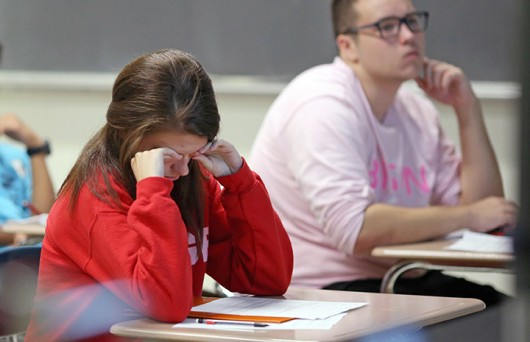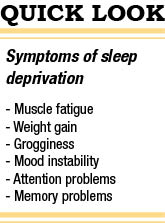With finals quickly approaching, some students are spending more time studying and less time sleeping.
Jesse Mindel, a neurologist and sleep medicine specialist at the Ohio State Wexner Medical Center, said this could have a negative impact.
“Most of the detrimental effects on your body and mind occur in a single episode of severe sleep deprivation,” he said.
Students who stay up all night to study are at most risk, Mindel said.
“If you’re reducing your sleep less than two hours (per night), then there isn’t any scientific evidence that you’re going to have any significant impairments in terms of your performance,” Mindel said.
“But even staying up all night one night is likely to have a major impact.”
The symptoms of sleep deprivation range from physical symptoms, including muscle fatigue, weight gain and grogginess, to cognitive symptoms, including mood instability, attention problems and memory problems, Mindel said.
“Prolonged periods of severe sleep deprivation is even likely to have a negative impact on your ability to fight off
infections,” he said.
In short, Mindel said students who stay up all night to cram for an exam “could actually be counterproductive.”
The more sleep deprivation, the more severe the symptoms and the longer recovery period, Mindel said. Allowing time to recuperate and catch up on lost sleep is important to that recovery process.
Some OSU students are concerned that their lack of sleep affects their performance in the classroom.
Alexandria Armeni, a second-year in zoology, said she has yet to pull an “all-nighter” to study.
“I try to manage my time — sleep’s pretty important to me and I know I can’t function if I don’t get enough of it,” she said.
Meanwhile, Albert Calvelo, a third-year in international studies, said he sometimes pulls all-nighters during midterms and finals week.
“It definitely affects me during exams,” Calvelo said, “I just feel tired when I’m taking (exams). I have instant regret when I sit down and open that exam booklet.”
Calvelo said staying up all night interferes with his attentiveness and memory function, and that afterwards, he crashes.
“After I’m done for the day, I’ll just go home and crash,” he said, “And that affects my sleep schedule — like, it really screws it up for the next day or two.”
Mindel explained that part of what makes sleep deprivation so detrimental goes back to what is called a “biological rhythm.”
“College students tend to be more active at night time, so they will stay up later and then sleep in later,” he said.
So when a student stays up later to study, they disturb that biological rhythm and they end up groggy in the morning with their body unable to go to sleep earlier than normal, Mindel said.
Mindel suggests that students plan out their studying to avoid too much sleep loss. He also suggests avoiding afternoon naps, which would disturb a student’s biological rhythm.




